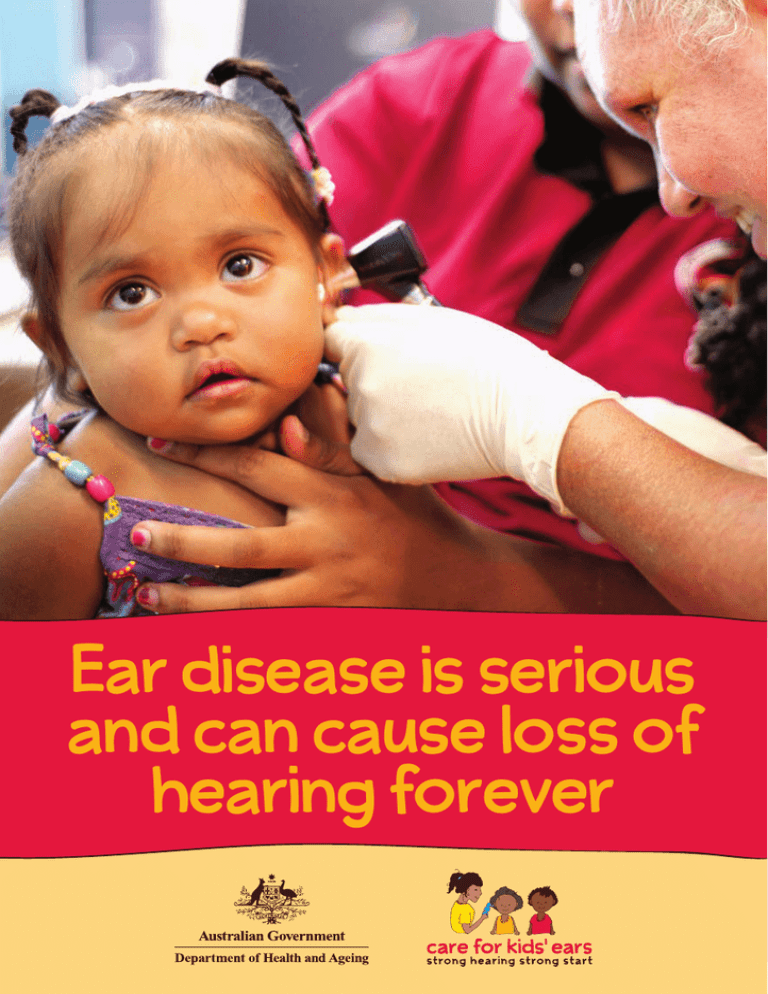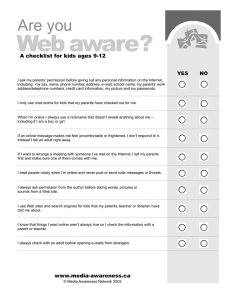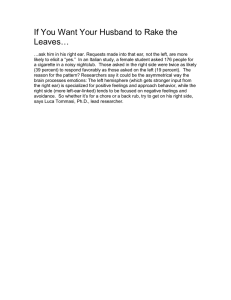
Ear disease is serious
and can cause loss of
hearing forever
Strong hearing, strong start.
• We all want kids to have a strong start to life.
• When kids’ ears are healthy, their hearing is strong.
• With strong hearing from birth, kids’ brains can develop properly.
• Kids are not born with ear infections but they can get
an ear infection soon after birth.
2
With healthy ears, kids can:
•
•
•
•
•
•
•
learn language and talking;
listen to family stories;
listen to music;
talk with family and friends;
be good at school;
feel good about themselves; and
get a job later in life.
3
Keep kids’ ears healthy by:
getting your kids’ ears checked regularly by a health worker, nurse or doctor and following their advice about treatments;
knowing the signs of ear infection; and
knowing how to prevent ear disease.
4
What is ear disease?
• Ears are connected to the nose by a tube.
• If your nose has a cold, your ears can get sick too.
• Sometimes kids’ ears get blocked from mucus (from a cold) or swelling.
• If ears are blocked, air can’t get in and fluid can’t drain
out of the ear.
• Left untreated, the eardrum can burst and leave a hole.
• Ear disease can cause loss of hearing forever.
ear tube
when the ear
tube gets
blocked, fluid
can build up
in the ear
5
Symptoms of ear disease
signs of a cold
(coughing, sore throat,
runny nose)
pain in the ear
runny fluid or pus
from ear
kids pulling ears
fever
6
Symptoms of ear disease
can’t hear
properly
not eating
diarrhoea or
vomiting
Don’t forget kids
can have ear
disease with none
of these symptoms.
You can ask your health worker, nurse or doctor
for an ear check at each visit. It’s important to
follow their advice about treatments.
7
How to prevent ear disease
Do:
Get your kids’ ears checked regularly.
Keep kids clean (wash hands and faces regularly).
Eat healthy food.
Make sure kids get all their vaccinations.
Get kids to blow their nose and put tissues in the bin.
Breastfeed - it helps fight infections.
8
How to prevent ear disease
Don’t:
Smoke - your smoke is bad for kids too.
Stick anything in your kids’ ears, unless recommended by your health worker,
nurse or doctor.
If your kids have ear disease, check with your health
worker, nurse or doctor before they go swimming.
9
Loss of hearing is hard for
parents and kids
When kids have hearing loss, it can be hard because:
• Babies and kids might not hear their name when called.
• Kids might be in danger if they can’t hear the cars on
the road.
• Kids might have difficulty learning language and talking.
• Kids might feel like no one understands them.
10
Ear disease can be prevented
and treated
• Ear disease can be prevented and treated by getting
your kids’ ears checked by a health worker, nurse or
doctor at each visit and following their advice about
treatments.
• Get kids’ ears checked, even if they seem okay. They could be sick with no symptoms.
• Treatment for ear disease may include medicine or, in some cases, an operation.
• If you are given medicine, it is important to take the full amount advised by your health worker.
11
For more details, please visit
www.careforkidsears.health.gov.au
Ear disease can be
prevented and treated.
Care for Kids’ Ears resources are based on the Recommendations for Clinical Care Guidelines
on the Management of Otitis Media in Aboriginal and Torres Strait Islander Populations (updated
2010), prepared by the Darwin Otitis Guidelines Group in collaboration with the Office for
Aboriginal and Torres Strait Islander Health (OATSIH) Otitis Media Technical Advisory Group, for OATSIH, Australian Government Department of Health and Ageing, Canberra, ACT.
ISBN: 978-1-74241-607-6
Online ISBN: 978-1-74241-608-3
Publications Approval Number: D0743
This work is copyright. You may reproduce the whole or part of this work in unaltered form for your
own personal use or, if you are part of an organisation, for internal use within your organisation,
but only if you or your organisation do not use the reproduction for any commercial purpose and
retain this copyright notice and all disclaimer notices as part of that reproduction. Apart from
rights to use as permitted by the Copyright Act 1968 or allowed by this copyright notice, all other
rights are reserved and you are not allowed to reproduce the whole or any part of this work in
any way (electronic or otherwise) without first being given the specific written permission from the
Commonwealth to do so. Requests and inquiries concerning reproduction and rights are to be
sent to the Online, Services and External Relations Branch, Department of Health and Ageing,
GPO Box 9848, Canberra ACT 2601, or via e-mail to copyright@health.gov.au.
All information in this publication is correct as of January 2013
D0743 January 2013
© Commonwealth of Australia 2013


